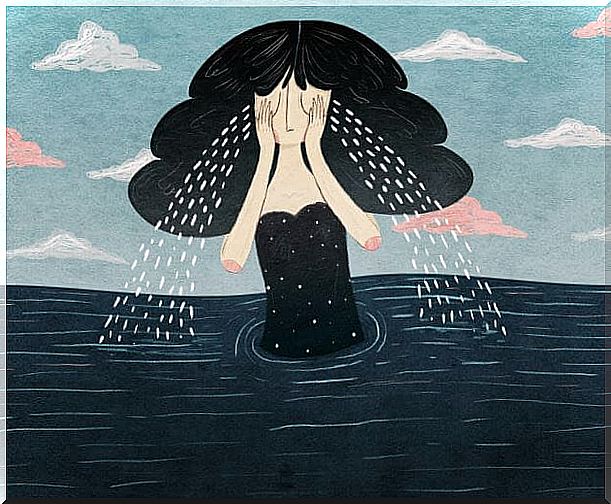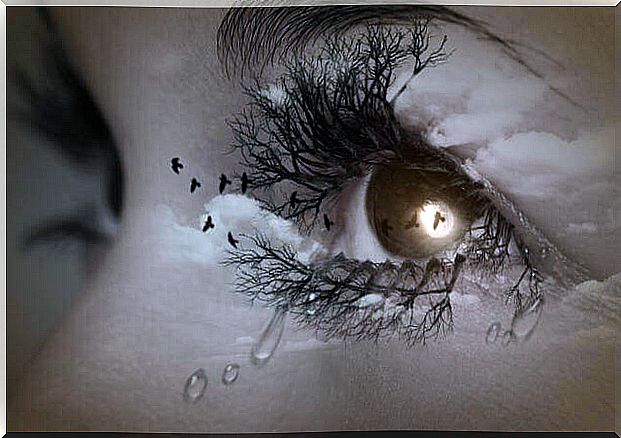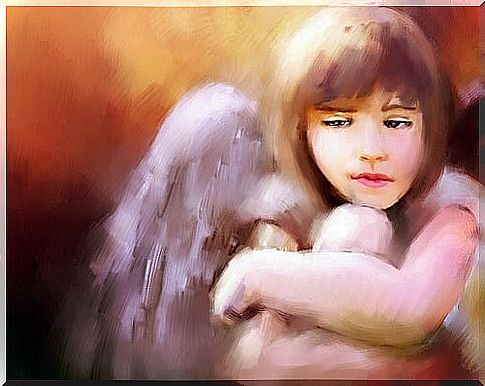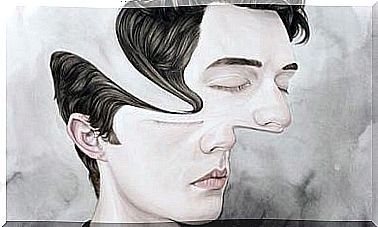13 Frequently Asked Questions After The Death Of A Loved One

The death of a loved one generates great regret and causes us to enter a state of lethargy from which it seems that we will never leave again. This is a natural state after a loss, it is the grief that is shaped in a unique way in each person.
Because when someone leaves, something inside us cracks. It is a feeling of difficult explanation that involves a multitude of thoughts and questions that many times we cannot answer.
To attend to these feelings and help ourselves, we must allow ourselves to explore and bring to light those questions that torment us and that direct our minds. Speaking and not vetoing is essential. The responses to this are highly variable, ranging from crying and anxiety to sadness and fear.

It is essential that we give ourselves time to react and elaborate, as well as allow the people who love us to accompany us. Silence, the look, the touch and the presence without signs of haste or discomfort have more value than words in these moments.
13 questions and 13 answers after the death of a loved one
Although each person experiences the death of a loved one differently, there are some questions that are common during grief. We cannot ignore this reality, since they add great unease and uncertainty to our emotional state. Let’s review some of the most frequent (Martínez González, 2010):
1. Will I forget her voice, her laugh, her face?
When a close person dies, we put all our efforts to ensure that they are present in everyday things. We feel that not remembering his laugh, his look, his face and the way he walked would be like betraying him. However, time makes his memory not so clear and doubts assail us, generating great regret at the possibility of forgetting what physically defined him.
Given this, we must know that, although our loved one is not there and we cannot touch or hear them, they remain in our hearts. The affection and the moments lived remain in our hearts and nothing and nobody will be able to take them away from us, not even time.
2. Am I going crazy? Will I be able to bear it?
The loss of a loved one causes a state of shock, of blockage, which is extremely difficult and alienating. So many emotions together create the feeling that we have lost control over ourselves. It should be said that almost always necessary to elaborate the event suffered, it is like a defense mechanism that aligns our great inner strength to combine the energies we need to come out afloat and continue with our life.

3. How long does this last?
The answer to this question is highly variable, since time depends on the circumstances that occurred, personal characteristics, the relationship that united us, the way the loss occurs, etc. However, the first Christmas, the first birthdays, the first holidays, etc.
The grief at not being able to share events, achievements and feelings with that person make us constantly relive the tragedy. However, we can say that this internal time is not a passive time, as it helps us accept death and live with it slowly.
4. Will I go back to being like before?
Obviously the death of a loved one marks and breaks us, which inevitably changes us. We lose parts of ourselves, parts that go with that person. We mature in some aspects, we reestablish our value system, we give importance to different things, we think differently. All of this constitutes learning that frequently transforms into a greater commitment to life.
5. Why has this happened to me? Why is it gone? Because right now?
In a desperate attempt to understand the incomprehensible and the unfair, we ask ourselves these kinds of questions. These have the function of helping us to review, analyze and understand reality in a rational way, since we feel the need to control and manage the situation to combat anxiety.
The death of a loved one is always untimely and undesirable. In the absence of answers, we will end up asking ourselves a “why”, which will be much more adaptive to restructure our experience and our grief.

6. Am I sick?
No. Anguish and painful feelings for the loss of a loved one do not constitute a disease, it is a natural process that we must attend to. This does not mean that we should not pay special attention, we should always meditate on it properly. We will need an indeterminate time to recover and reestablish a psychological balance that allows us to manage our emotions and our thoughts.
However, when the grief lasts for more than a year and the symptoms continue to be maladaptive, we can speak of a pathological grief. What are dasadaptative symptoms? Those that prevent us from leading a normal life, for example, such a high level of anxiety that it interferes with our daily and work performance. In this case, we must ask for specialized help to help us overcome this stage.
7. Do I need psychological help?
The healthy thing is to be bad during the period of mourning. In the first moments, the mourner needs to express, review and remember the absent person constantly over and over again. Some people need a professional to mark the limits of discomfort as well as to be listened to, accompanied and understood unconditionally.
This is offered by therapy, but certainly not everyone needs therapeutic help to get along the way. Therefore this will depend on personal conditions. If you need help, the intervention can be summarized in five points (Meza, 2008):
- Improve the quality of life of the sufferer.
- Reduce social isolation.
- Increase self-esteem.
- Decrease stress levels.
- Improve mental health (disease prevention).
8. What do I do with your things?
Reactions are often extreme. Some people get rid of everything under the idea that it will mitigate the pain of the memory, while others keep everything in the same way that the deceased left it. Any reaction indicates that there is no acceptance of the loss, so it is advisable to help that person to assimilate the absence.
There is no healthier way than another to proceed, but what is advisable is not to fall into extremes. However, we have to bear in mind that keeping those things of more sentimental value will help us remember with love and affection within the meaning that we give it.
9. Does time heal everything?
Time does not heal everything, but it certainly offers us perspective. By putting experiences and time along the way, we put distance between the painful event and the present. This causes us to have to choose to take one or another attitude towards life: we can have a defeatist attitude or we can have an attitude of improvement. Time helps us rethink it.

10. When is the duel over?
Team Erika Meza (2008) states that the duel has been overcome when we are able to talk of being died without pain. At the same time, we are once again able to invert our emotions in life and in the living. When we invest our energies in relationships, in ourselves, in our work projects and in feeling better, that is when we begin to renew our illusion for life.
It is that moment in which we can already remember with affection, affection and nostalgia, but the memory does not frame us in a deep pain, in an endless emotional state.
11. What can I do with all this that I experience and feel?
After the whirlwind of emotions and sensations that have overwhelmed us, we are faced with the approach of utility. Each of these manifestations has an intimate meaning that we have to work on, explore and decipher in order to rebuild ourselves. It can help us to write about it, listen to music that invites us to process emotions, or do some activity that is meaningful to us.
This will help us to thank and fondly remember the deceased person, who will never leave us because they will remain with us as memories and learnings.
12. What are the signs of grief?
After the death of a loved one it is possible to experience many feelings. Sadness, anxiety, anger, guilt, tiredness, helplessness, and loneliness are often felt. Some people are ashamed, others are relieved.
There are also certain physical sensations that are usually experienced : tightness in the chest or throat, pain in the heart area, palpitations, dizziness, nausea, tremors, etc.
For their part, grieving people sometimes don’t sleep well or sleep too much. The same goes for their eating habits: they eat too little or too much, or they eat inappropriately. They may have unusual dreams or nightmares, be distracted, withdraw socially, or engage in restless hyperactivity. All of these feelings and behaviors are normal during grief.
13. Where is hope found after the death of a loved one?
There are many times when people report that they have grown stronger as a result of the loss they have experienced. They become more mature, more understanding of others, more self-aware.
Other people learn new lessons about the meaning of life, as well as the meaning of love. These are often difficult lessons, lessons that one wishes one did not have to learn in this way. But they are gateways to a brighter future.
–
Main illustration by Mayra Arvizo
Martínez González, RM (2010). Scars on the heart after a significant loss. Bilbao: Desclée de Brouwer.









